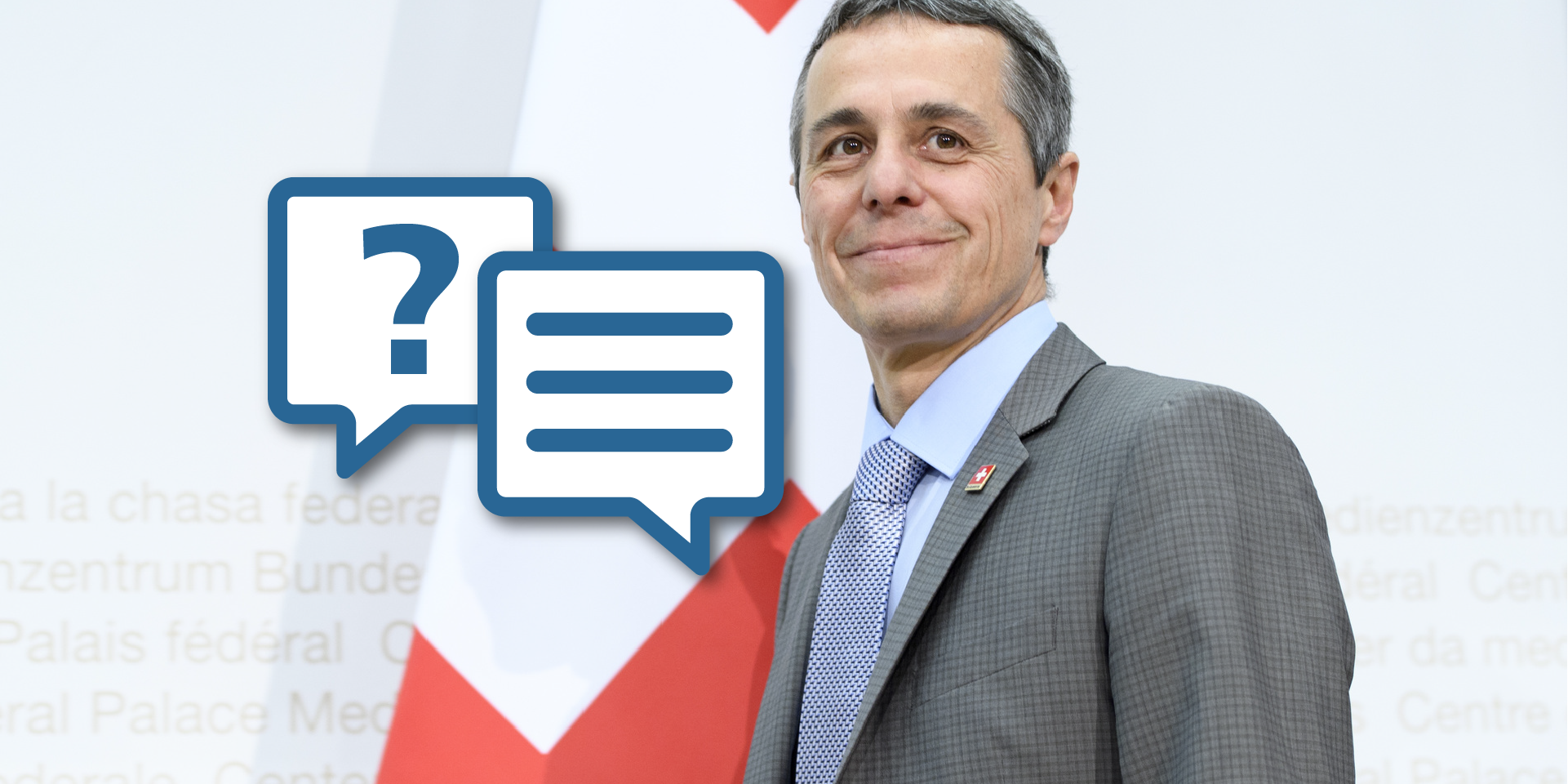"The Enlightenment taught us to look at things in an unbiased way"
What motivates people? What role does prosperity play in the satisfaction of human needs? And how is the Brexit agreement different from Switzerland's bilateral relations with the EU? In an interview with the Neue Zürcher Zeitung (NZZ), Federal Councillor Ignazio Cassis gives his views on current issues and highlights why a willingness to listen and interest in political and cultural diversity are crucial, particularly in heated discussions.

In an interview with the NZZ, Federal Councillor Ignazio Cassis talks about increasing polarisation, Switzerland's strengths, and its relations with Europe. © FDFA
Maslow's hierarchy of needs is a model – usually portrayed as a pyramid – that illustrates human needs, wants and desires. At the bottom of the pyramid are basic needs, such as air, food and safety, while the upper layers comprise social, individual and cognitive needs. At the top is self-actualisation, which means the opportunity to fulfil your own potential.
In the interview, Ignazio Cassis explains that he is increasingly seeing a move away from collective security towards individual freedom, including in political dealings. "This has to do with self-promotion and individualism. And individualism is a consequence of prosperity. Those who are poor must first satisfy their physiological needs. Self-actualisation is only possible for those living in prosperity," explains the head of the Federal Department of Foreign Affairs (FDFA).
Unus pro omnibus, omnes pro uno
He goes on to say that we are observing a shift in Maslow's hierarchy of needs in Switzerland, including during the COVID-19 pandemic. "We have probably yet to realise the full scale of the pandemic's impact. If it ends up not being that great, this trend towards individualism could accelerate. If, on the other hand, it is associated with suffering, anxiety about the future and loneliness, the majority of society will move back down to the bottom of Maslow's pyramid. When there is a greater need for security, people show solidarity and come together again," Mr Cassis explains.
This is in keeping with Switzerland's motto: unus pro omnibus, omnes pro uno (one for all, and all for one). "We've realised that we in Switzerland cannot fight alone. We have to stick together."
The fear of saying something wrong
Sticking together also means working together, making compromises, talking to one another. And this is something that gets more difficult as society becomes more individualistic, which in turn leads to greater polarisation. More and more, it seems there is only one 'correct' opinion. "I'm seeing many people who feel they can no longer say what they think. There is a great deal of pressure to say only what is agreeable. While everyone's talking about diversity of opinion, I sense that people are increasingly inhibited and don't dare to think differently," says Mr Cassis.
The Federal Councillor believes that Switzerland's strength lies precisely in its open dialogue and its political and cultural diversity. "A liberal democracy can only exist if you openly engage with the arguments of people who hold different views. The Enlightenment taught us to look at things in an unbiased way," he argues.
Swiss interest in the EU single market

Engaging in collective dialogue is paramount, particularly in heated debates, for example on Switzerland's relations with the EU. Proud of its history and sovereignty, Switzerland has always maintained a lively debated relationship with the European Union (EU). Mr Cassis underscores the importance of staying calm and discussing things objectively.
Declaring negotiations dead and closing off communication channels is rarely a good approach when trying to reach a mutually satisfactory outcome. "Some people mistook the reset for a shutdown. But these are two different functions on a notebook. However, it remains to be seen whether or not Switzerland and the EU will reach a compromise in the talks. I have always said that the Federal Council will only sign an agreement if it feels right for Switzerland."
But it's also clear that for a country with a strong export economy, the European countries play a crucial role. "We therefore want to continue partial participation in the EU single market. And this requires a framework agreement," stresses Mr Cassis.
Many negotiations in a difficult environment
Participation in the EU single market is one of the central differences with the new trade agreement struck between the EU and the United Kingdom. While people are keen to draw parallels between Brexit and the Swiss negotiations, it is not that simple. "We mustn't compare apples and oranges. The UK has no partial integration in the EU single market like we have. So there's no legal harmonisation either."
Although Swiss–EU and UK–EU relations are not comparable, Switzerland is pleased that the two parties were able to agree on a Brexit agreement, even if this means that the actual work is only just beginning. "The Brexit trade agreement is a bare-bones deal. Countless working groups will now be set up and in the next few years will be doing exactly what Switzerland has been doing since 1992. It is the beginning of many negotiations in which both sides will try to inch forward."
Especially in politically difficult times and in a fraught geopolitical climate, fact-based argument is important. Talking to each another, listening to one another, and working together towards a common future must be the goal of all involved. Political stability – particularly within European countries – is crucial to prosperity throughout the continent.


